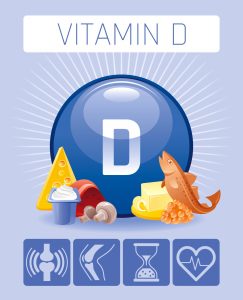 Obesity is a growing problem around the world today. Along with these growing statistics is also the growing amount of diet and exercise programs trying to help people lose weight. Recent research shows though that diet and exercise may not be the whole solution to the obesity issue. Vitamin D, also known as the sunshine vitamin, may be the key to helping people lose weight and lower risk of chronic disease.
Obesity is a growing problem around the world today. Along with these growing statistics is also the growing amount of diet and exercise programs trying to help people lose weight. Recent research shows though that diet and exercise may not be the whole solution to the obesity issue. Vitamin D, also known as the sunshine vitamin, may be the key to helping people lose weight and lower risk of chronic disease.
What is vitamin D?
Vitamin D is a fat-soluble vitamin that you can soak in from the sun as well as from a few food items. Since it is not found in many foods, it is important to get this vitamin from the sun. Therefore, if you do not go outside often for any reason or if you live in an area that is very cloudy, you may have to take a supplement.
Foods you can eat to get this sunshine vitamin include fatty fish like salmon, tuna, and mackerel. You can also get small amounts in beef liver, egg yolks, or cheese. Also, some milks or orange juices may be fortified with the vitamin.
The recommended daily intake of vitamin D is 800 IUs, or international units. When you go to the doctor, you can ask to have your levels of the vitamin checked. It is not usually a part of the standard lab tests. Your blood level of vitamin D should be at least 30nmol/L, but ideally around 50 nmol/L. If it is less than this number, your doctor may put you on a supplement regimen to help bring up your levels of the vitamin.
You can also buy vitamin D supplements on your own such as Maxasorb by Vita Sciences. Maxasorb provides 2000 IU’s of vitamin per dose. This formula provides vitamin D3 as well as vitamin E and moisturizing aloe in an easy to apply cream to help support immunity and well-being.
Those at risk for vitamin D deficiency include:
- older adults
- those with limited exposure to the sun
- people with dark skin
- those with fat malabsorption conditions like inflammatory bowel disease
- those who have had gastric bypass surgery
- breastfed infants
Those who are deficient may be at risk for bone health issues like osteoporosis. Also, as current research shows, vitamin D deficient individuals may also be at risk for developing obesity.
Vitamin D and obesity
A recent study looked at the effect of vitamin D on overweight and obese children and adolescents. Study results show that those children who were given vitamin D supplements daily for 12 months had lower body mass index (BMI), body fat, and improved cholesterol levels as compared to those who were not supplemented. Researchers suggest that vitamin D supplements may be able to help youth reduce their risk of chronic disease as adults.
Other ways to reduce disease risk
Besides keeping your vitamin D levels healthy, there are other things you can do now to help reduce your chronic disease risk.
- Stay active: You should try to be active most days of the week for at least 30 minutes a day. This can include walking, gardening, cleaning house, swimming, cycling, or any other movement that gets your heart rate up a bit. Exercise is not only great for heart health, but can also help you expend energy to help you sleep better at night and also can help you manage stress and anxiety.
- Get plenty of sleep: The average adult should get at least 7 to 9 hours of sleep each night for optimal health. This is because during bedtime your body works to regulate hormones, fluids, blood pressure, and many more processes.
- Quit smoking or don’t start: Smoking can constrict blood vessels and in turn increase your risk of heart disease. Therefore, if you don’t already smoke, don’t start. If you do smoke, visit smokefree.gov for resources to help you quit.
- Limit drinking alcohol: Research has shown that alcohol can increase triglycerides, or fat, in the blood. It can also increase risk of high blood pressure and other heart health issues. Therefore, limit your alcohol intake to no more than the recommendation of one standard drink a day for women or two a day for men. One standard drink is equal to about 12 ounces of beer, 5 ounces of wine, and 1.5 ounces of hard liquor.
- Manage stress: Stress and anxiety can get your blood pressure high and can also impact other healthy lifestyle choices you want to make. Therefore, work on getting your stress levels down. You can do this by talking to a counselor, doing some yoga or meditation, or practicing relaxation breathing. Reducing stress can also reduce emotional eating, increase your energy, and can make you feel better overall.
-written by Staci Gulbin, MS, MEd, RD, LDN
References:
American Heart Association (August 15, 2014) “Alcohol and Heart Health.”
American Heart Association (accessed October 3, 2018) “Be Healthy for Good with Life’s Simple 7 Infographic.”
Anxiety and Depression Association of America (accessed October 3, 2018) “Physical Activity Reduces Stress.”
Hindustan Times (September 28, 2018) “Vitamin D supplements can help obese children lose weight.”
National Institutes of Health Office of Dietary Supplements (September 18, 2018) “Vitamin D.”
National Sleep Foundation (accessed October 3, 2018) “Why Do We Need Sleep?”